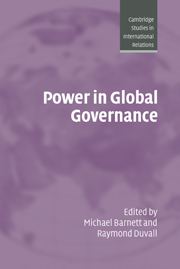Book contents
- Frontmatter
- Contents
- Notes on the contributors
- Acknowledgements
- 1 Power in global governance
- 2 Power, institutions, and the production of inequality
- 3 Policing and global governance
- 4 Power, fairness, and the global economy
- 5 Power politics and the institutionalization of international relations
- 6 Power, governance, and the WTO: a comparative institutional approach
- 7 The power of liberal international organizations
- 8 The power of interpretive communities
- 9 Class powers and the politics of global governance
- 10 Global civil society and global governmentality: or, the search for politics and the state amidst the capillaries of social power
- 11 Securing the civilian: sex and gender in the laws of war
- 12 Colonial and postcolonial global governance
- 13 Knowledge in power: the epistemic construction of global governance
- References
- Index
- CAMBRIDGE STUDIES IN INTERNATIONAL RELATIONS: 98
12 - Colonial and postcolonial global governance
Published online by Cambridge University Press: 22 September 2009
- Frontmatter
- Contents
- Notes on the contributors
- Acknowledgements
- 1 Power in global governance
- 2 Power, institutions, and the production of inequality
- 3 Policing and global governance
- 4 Power, fairness, and the global economy
- 5 Power politics and the institutionalization of international relations
- 6 Power, governance, and the WTO: a comparative institutional approach
- 7 The power of liberal international organizations
- 8 The power of interpretive communities
- 9 Class powers and the politics of global governance
- 10 Global civil society and global governmentality: or, the search for politics and the state amidst the capillaries of social power
- 11 Securing the civilian: sex and gender in the laws of war
- 12 Colonial and postcolonial global governance
- 13 Knowledge in power: the epistemic construction of global governance
- References
- Index
- CAMBRIDGE STUDIES IN INTERNATIONAL RELATIONS: 98
Summary
In October 2003, in a memo leaked to the US press, Donald Rumsfeld, the US secretary of defense, claimed that the George W. Bush administration “lack[ed] [the] metrics to know” if it was “winning or losing the global war on terror.” Elaborating on this theme, Rumsfeld wondered whether the United States was “capturing, killing or deterring and dissuading more terrorists every day than the madrassas and the radical clerics are recruiting, training and deploying against us.” Rumsfeld's comments bring home, quite starkly, the emphasis placed by the Bush administration on “compulsory power” (“capturing, killing or deterring and dissuading …”) (table 1.1, p. 12). While this brutally competitive, if quotidian, enterprise does not appear to lack measurable features (“more terrorists everyday than the madrassas and the radical clerics are … deploying”), what seems missing is a broader focus on the interpretive dimension of the United States's “war on terror.” Rumsfeld's predominant concern, it seems, is on the measures, the metrics, of the “global war on terror” rather than on its social meanings. What he appears not to be inquisitive about are the global meanings of the war on terror, the underlying social relations, diffuse and direct, productive of these meanings, and whether the United States is “winning or losing the global war on terror” on this interpretive dimension. A focus on the global meanings of the war on terror would draw our attention to the historically broader field of meanings – the productive power – governing the conflict.
- Type
- Chapter
- Information
- Power in Global Governance , pp. 273 - 293Publisher: Cambridge University PressPrint publication year: 2004
- 2
- Cited by



